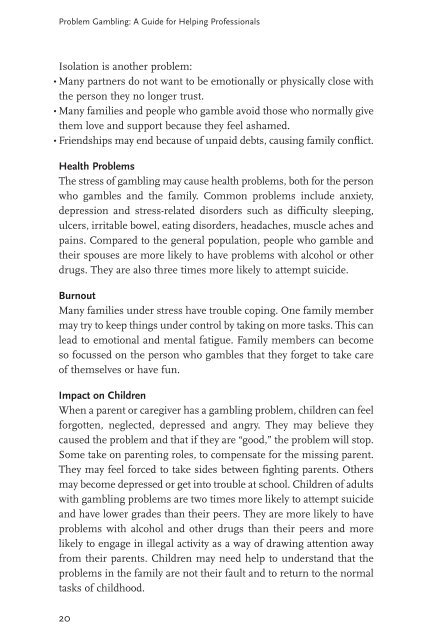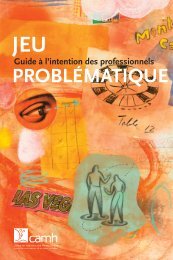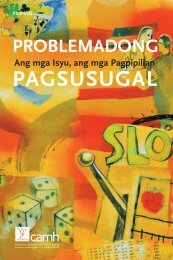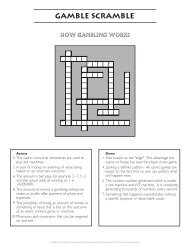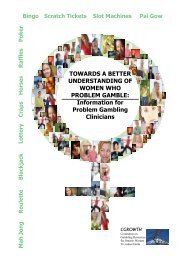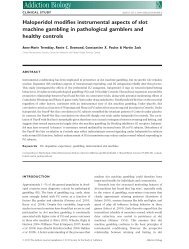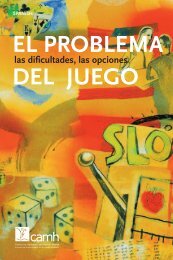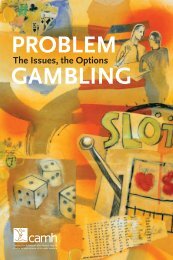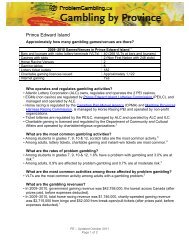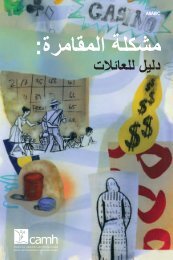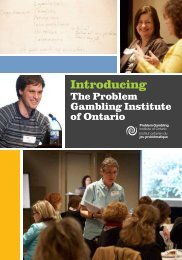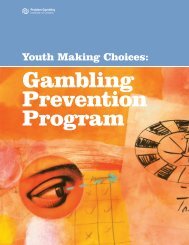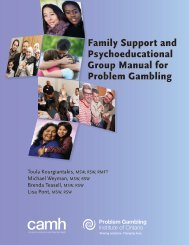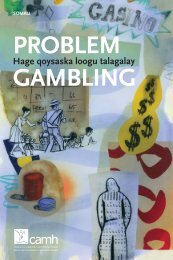Problem Gambling: A Guide for Helping Professionals
Problem Gambling: A Guide for Helping Professionals
Problem Gambling: A Guide for Helping Professionals
You also want an ePaper? Increase the reach of your titles
YUMPU automatically turns print PDFs into web optimized ePapers that Google loves.
<strong>Problem</strong> <strong>Gambling</strong>: A <strong>Guide</strong> <strong>for</strong> <strong>Helping</strong> <strong>Professionals</strong><br />
Isolation is another problem:<br />
• Many partners do not want to be emotionally or physically close with<br />
the person they no longer trust.<br />
• Many families and people who gamble avoid those who normally give<br />
them love and support because they feel ashamed.<br />
• Friendships may end because of unpaid debts, causing family conflict.<br />
Health <strong>Problem</strong>s<br />
The stress of gambling may cause health problems, both <strong>for</strong> the person<br />
who gambles and the family. Common problems include anxiety,<br />
depression and stress-related disorders such as difficulty sleeping,<br />
ulcers, irritable bowel, eating disorders, headaches, muscle aches and<br />
pains. Compared to the general population, people who gamble and<br />
their spouses are more likely to have problems with alcohol or other<br />
drugs. They are also three times more likely to attempt suicide.<br />
Burnout<br />
Many families under stress have trouble coping. One family member<br />
may try to keep things under control by taking on more tasks. This can<br />
lead to emotional and mental fatigue. Family members can become<br />
so focussed on the person who gambles that they <strong>for</strong>get to take care<br />
of themselves or have fun.<br />
Impact on Children<br />
When a parent or caregiver has a gambling problem, children can feel<br />
<strong>for</strong>gotten, neglected, depressed and angry. They may believe they<br />
caused the problem and that if they are “good,” the problem will stop.<br />
Some take on parenting roles, to compensate <strong>for</strong> the missing parent.<br />
They may feel <strong>for</strong>ced to take sides between fighting parents. Others<br />
may become depressed or get into trouble at school. Children of adults<br />
with gambling problems are two times more likely to attempt suicide<br />
and have lower grades than their peers. They are more likely to have<br />
problems with alcohol and other drugs than their peers and more<br />
likely to engage in illegal activity as a way of drawing attention away<br />
from their parents. Children may need help to understand that the<br />
problems in the family are not their fault and to return to the normal<br />
tasks of childhood.<br />
20


